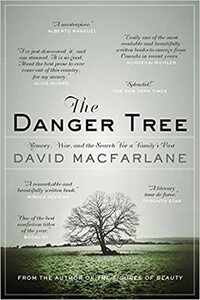Take a photo of a barcode or cover
8 reviews for:
The Danger Tree: Memory, War, and the Search for a Family's Past
David MacFarlane, Lisa Moore
8 reviews for:
The Danger Tree: Memory, War, and the Search for a Family's Past
David MacFarlane, Lisa Moore
adventurous
challenging
emotional
informative
reflective
sad
medium-paced
emotional
inspiring
reflective
medium-paced
This book, while very well written with some sections of beautiful imagery and prose, is also circuitous and confusing. I thoroughly enjoyed the parts pertaining to the war history, but the rest of the family history was confusing.
If you are interested in the history of Newfoundland families, give this a go, if you are looking for a straight history of the First World War, I would look elsewhere.
If you are interested in the history of Newfoundland families, give this a go, if you are looking for a straight history of the First World War, I would look elsewhere.
Come From Away
This was a totally engaging family history which also encompassed the history of Newfoundland.
David MacFarlane tells the story of his mother's Newfoundlander heritage by assembling family stories of his maternal great-grandparents and his great aunts and uncles. The often tragic stories include deaths in the First World War, from which the title "The Danger Tree" comes from. "The Danger Tree" was a marker in the no-man's-land between the Allied and German trenches where the Newfoundland Regiment fought at Beaumont-Hamel, France. The tree's (or its replacement's) mummified remains are encased in concrete at today's Beaumont-Hamel Newfoundland Memorial Site http://www.veterans.gc.ca/eng/remembrance/memorials/overseas/first-world-war/france/beaumonthamel.
This book was originally published in 1991 with the title "Come From Away", which is a common Newfoundlander expression for visitors or tourists to their island. At some point the title in subsequent re-printings was changed to "The Danger Tree," perhaps to avoid confusion with the Broadway musical? The story related to the new title isn't explained until the final chapter though.
Trivia
Canadian poet [a:E.J. Pratt|396861|E.J. Pratt|https://images.gr-assets.com/authors/1461028732p2/396861.jpg] seems to have been quite the grifter in his younger days on Newfoundland. The stories in this book have him selling some sort of fake tuberculosis cures to finance his eventual education and life in Toronto, Canada where the E.J. Pratt Library at Victoria College, University of Toronto now bears his name.
This was a totally engaging family history which also encompassed the history of Newfoundland.
David MacFarlane tells the story of his mother's Newfoundlander heritage by assembling family stories of his maternal great-grandparents and his great aunts and uncles. The often tragic stories include deaths in the First World War, from which the title "The Danger Tree" comes from. "The Danger Tree" was a marker in the no-man's-land between the Allied and German trenches where the Newfoundland Regiment fought at Beaumont-Hamel, France. The tree's (or its replacement's) mummified remains are encased in concrete at today's Beaumont-Hamel Newfoundland Memorial Site http://www.veterans.gc.ca/eng/remembrance/memorials/overseas/first-world-war/france/beaumonthamel.
This book was originally published in 1991 with the title "Come From Away", which is a common Newfoundlander expression for visitors or tourists to their island. At some point the title in subsequent re-printings was changed to "The Danger Tree," perhaps to avoid confusion with the Broadway musical? The story related to the new title isn't explained until the final chapter though.
Trivia
Canadian poet [a:E.J. Pratt|396861|E.J. Pratt|https://images.gr-assets.com/authors/1461028732p2/396861.jpg] seems to have been quite the grifter in his younger days on Newfoundland. The stories in this book have him selling some sort of fake tuberculosis cures to finance his eventual education and life in Toronto, Canada where the E.J. Pratt Library at Victoria College, University of Toronto now bears his name.
Since I moved to a small outport community on the South coast of the island, I have been looking for a really good book about Newfoundland. Up til now, none that I had attempted had quite done it for me: Gwyn's biography of Smallwood just made me angry, "Random Passage" would have been better titled "Random People" for how many characters it contained, and the Newfoundland of "The Shipping News" was unrecognizable to me. Here, however, is a really good book about my home. MacFarlane captures the flavour of the place perfectly, and his love for his family and the fondness of his memories of the province allow him to be appropriately affectionate. By skillfully setting the exploits of his family members against the backdrop of Newfoundland's history in the 20th century, MacFarlane presents a Newfoundland that is worthy of the reader's love and respect, and is highly recommended to anyone with ties to the island.
adventurous
challenging
dark
emotional
funny
informative
reflective
sad
tense
slow-paced
Graphic: Death, Violence, Grief, War
I loved that Macfarlane has written a memoir about his family based on nothing more than photos, letters (remember those?), old stories and mythologies from friends and family, and his own vague childhood memories. And the occasional, deeply biased school text book from the 1950s (to hilarious effect). He manages to frame his memoir and the stories in it within the history of Newfoundland, Canada, and WWI without necessarily having to rely on the Truth. Rather, he explains that he is surmising the details of the lives of his family members based on the larger social history that created them, on the stories he was told as a child, and on rumour and imagination. He uses well-known battle history to imagine what the lives of his 3 great-uncles, killed in the war, might have been like, and how they might have ended, and for what. Most poignantly, he regrets again and again not listening more closely to the stories his elderly relatives told, not asking them more questions. He forgives his teenage self, but he’s sorry to have missed the opportunities. Still, The Danger Tree is a lovely homage to them, and to the sacrifices made by those he never had a chance to meet at all.
Just couldn't get into it so I did not finish it. I've gotten to the point where I realize I'll never read all the books on my wish list so I'm not wasting time on anything I suspect won't improve.



